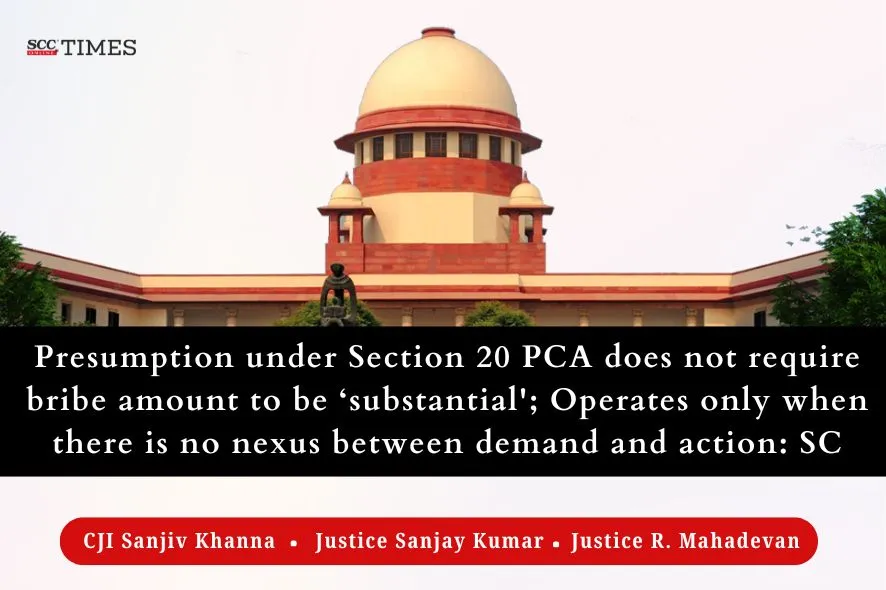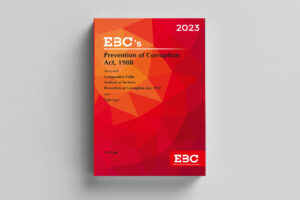Supreme Court: In a criminal appeal against the decision of the Karnataka High Court, setting aside the conviction of the accused/ respondent and thereby acquitting him of the charges punishable under Sections 7 and 13(1)(d) r/w Section 13(2) of the Prevention of Corruption Act, 1988 (‘the Act’), the three-Judge Bench comprising of CJI Sanjiv Khanna, Sanjay Kumar and R. Mahadevan*, JJ. set aside the High Court’s decision terming it as illegal, erroneous and contrary to the materials on record. In the present case, the recovery of the bribe amount from the accused was duly proved. The Court observed that, once the aspects of ‘demand’ and ‘acceptance’ of the bribe amount have been established beyond doubt, no two views are possible in the matter. Thus, the approach adopted by the High Court was perverse and liable to be interfered with. The Trial Court was directed to take necessary steps to secure the accused and commit him to prison to undergo the remaining sentence period and recover the fine imposed on him.
“It is settled law that if the two basic facts viz., ‘demand’ and ‘acceptance’ of gratification have been proved, the presumption under Section 20 can be invoked to the effect that the gratification was demanded and accepted as a motive or reward as contemplated under Section 7 of the Act. However, such presumption is rebuttable. Even on the basis of the preponderance of probability, the accused can rebut the same.”
Background
The complainant (PW1) working as a Second Division Assistant in Mahanteshwar High School situated alleged that after preparing a bill for encashment of surrender leave salary payable to himself and three non-teaching staff the bill was submitted to the Sub Treasury Office, Afzalpur as per the instructions of the Block Education Officer, Afzalpur. On examination of the same, the accused, who was working as First Division Assistant in the said office of the Sub Treasury, directed the complainant to take back the bill as it could not be passed. When the complainant requested to pass the same, the respondent demanded illegal gratification of Rs.500/- each (in total, Rs.2,000/-). The complainant recorded the conversation between himself and accused who demanded a bribe of Rs.2,000/- and told him that only after payment of the same, the bill will be passed, and a cheque would be issued. The same was handed over to the Lokayukta Police on 05-08-2009 with a request to act against the accused. A complaint was registered under Section 13(1)(d) r/w Section 13(2) of the Act.
The Trial Court found the accused guilty of the offences under Sections 7 and 13(1)(d) r/w Section 13(2) of the Act and sentenced him to undergo imprisonment for six months and to pay a fine of Rs.2,500/-, and to undergo imprisonment for a period of two years and to pay a fine of Rs.5,000/-, for offence under Section 7. However, the High Court acquitted him of the charges.
Analysis and Decision
Reiterating the settled law, the Court relied on C.M.Girish Babu v. CBI and in B.Jayaraj v. State of A.P., wherein, while considering the case under Sections 7, 13(1)(d)(i) and (ii) of the Act, it was reiterated that it has to be proved beyond reasonable doubt that the accused voluntarily accepted money knowing it to be bribe; absence of proof of demand for illegal gratification and mere possession or recovery of currency notes is not sufficient to constitute such offence; and the presumption under Section 20 of the Act can be drawn only after demand for and acceptance of illegal gratification is proved.
The Court also noted that the Constitutional Bench in Neeraj Dutta v. State (Govt of NCT of Delhi) (2023) 4 SCC 731 answered the issue ‘whether in the absence of evidence of the complainant / direct or primary evidence of demand of illegal gratification, it is permissible to draw an inferential deduction of culpability / guilt of a public servant under Sections 7 and 13(1)(d) read with Section 13(2) based on other evidence adduced by the prosecution’ in affirmative.
Perusing the sanction order granted to take cognizance of an offence punishable under Sections 7, 10, 11, 13 and 15 of the Act against the accused, the Court said that there was no procedural irregularity in the grant of sanction. Further, the Court said that the deposition of PW 1 was corroborated by PW 2 and PW3, who were shadow witness and the person who counted the seized currency, respectively. The shadow witness who accompanied the complainant at the time of trap, categorically stated in his evidence about the drawing of seizure- the recovery of tainted currency notes from the possession of the accused.
Additionally, the Court noted that from the evidence of the officials working in the office of the Sub Treasury of Afzalpur, it was clarified that the accused was entrusted with the work of receiving and checking the surrender leave salary bill presented by the complainant/ PW1. One of the officers had also stated that the money was recovered from the accused; and in the cross-examination stated that the bills prepared in the school were produced to treasury through staff and he did not know that the accused had no pending work relating to the complainant as on 05-08-2009. The Court said that officials consistently deposed in respect of trap laid by the Lokayukta Police on the accused and seizure of tainted currency notes from his possession. The Court also perused and referred to the testimony of other witnesses who supported the case of the prosecution in entirety about ‘demand’ and ‘acceptance’ of the bribe amount and also recovery of the same from the possession of the accused.
Regarding the contention that the bill was passed on 29-07-2009 and it was sent for preparation of cheque to another official on the same day itself and the cheque was also ready on 30-07-2009 and hence, on the date of alleged trap i.e., on 05-08-2009, there was no work pending with the accused and he did not demand or accept bribe from the complainant, the Court noted from the testimonies that no cheque was issued, and kept pending as on the date of trap.
In the matter at hand, the Court said that the prosecution proved its case beyond reasonable doubt, in respect of the ‘demand’ and ‘acceptance’ of the bribe amount from the complainant and recovery of tainted currency notes from the possession of the accused. The said operation is preceded by recording of the demand in the tape recorder. Further, the Court added that accused failed to rebut of the presumption by disproving the case of the prosecution either in the cross-examination of the prosecution side witnesses or by adducing material evidence that the receipt of Rs.2,000/- was not a bribe amount, but a legal fee or repayment of loan.
The Court upheld the Trial Court’s view holding that it rightly found the accused guilty of the offences punishable under Sections 7 and 13 (1) (d) r/w Section 13 (2) of the Act and sentenced him for the same and set aside the High Court’s decision stating that by placing reliance on A.Subair’s case (supra), the High Court held that since no work was pending with the accused as on the date of trap, the ingredient to attract and complete the offences punishable under Sections 7, 13(1)(d) read with Section 13(2) of the Act was not met- was unsustainable as the decision of this Court in A.Subair (supra) did not support the view.
Insofar as the reference to Section 20(3) regarding the triviality of the gratification, the act sought or performed, and the amount demanded cannot be considered in isolation to each other, the Court said that the value of gratification is to be considered in proportion to the act to be done or not done, to forbear or to not forebear, favour or disfavour sought, so as to be trivial to convince the Court, not to draw any presumption of corrupt practice. It is also not necessary that only if substantial amount is demanded, the presumption can be drawn. The overall circumstances and the evidence will also have to be looked into. The Court stated that-
Section 20 would come into operation only when there is no nexus between the demand and the action performed or sought to be performed. But, when the fact of receipt of payment or an agreement to receive the gratification stands proved, there is a clear case of nexus or corroboration and the presumption itself is irrelevant.
Section 20 gets attracted when it is proved that the public servant has accepted or agreed to accept any gratification other than legal remuneration and in that case, the presumption is that it is the motive or reward for any of the acts covered under Section 7, 11 or 13(1)(b) of the Act. The Court explained that the presumption under Section 20 is similar to Section 118 of the Negotiable Instruments Act, 1881, where the onus is on the accused to prove that he is not guilty of the offences charged. The first two limbs under sub-section (1) and (2) of Section 13 make it clear that adequacy of consideration is irrelevant to draw the presumption. Further, the Court added that Section 20(3) only grants a discretion to the Court to decline from drawing any presumption if the amount is so trivial that such inference of corruption is not fairly possible in the facts of the case. Therefore, it is not a rule but an exception available to the Court to exercise its discretionary power in the facts and circumstances of the case. The Court pointed that in the facts of the case, the Court was not inclined to exercise such discretion.
[State of Karnataka v. Chandrasha, 2024 SCC OnLine SC 3469, decided on: 26-11-2024]
*Judgment Authored by: Justice R. Mahadevan
Advocates who appeared in this case :
For the appellant: AOR DL Chidananda
For the respondent: AOR Anirudh Sanganeria




